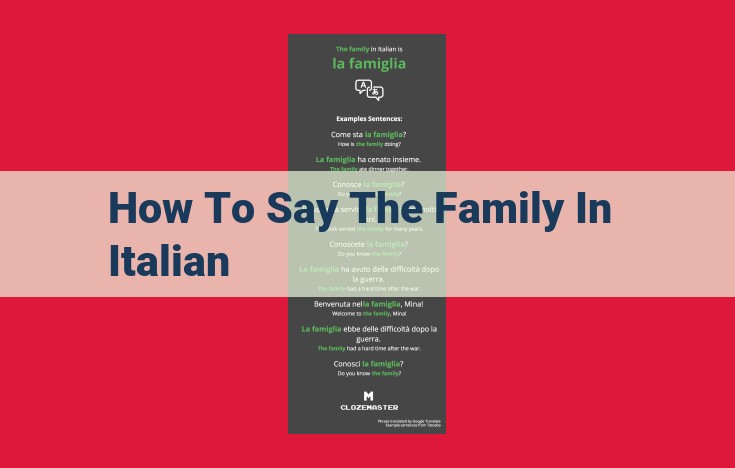To say “family” in Italian, use the word “famiglia.” Within the Italian language, there are specific terms for each family member, including “mamma” (mother), “papà” (father), “figlio” (son), “figlia” (daughter), “marito” (husband), and “moglie” (wife). These words convey the distinct roles and relationships within the Italian family structure.
Introducing the Core Family Members:
- Definition of “core family”
- Mamma: Mother’s role and significance
- Papà: Father’s role and responsibilities
- Figlio: Son’s importance and family dynamics
- Figlia: Daughter’s role and relationships within the family
- Marito: Husband’s role in the core family
- Moglie: Wife’s role and contribution to the family unit
Understanding the Core Family in Italian Culture: A Storytelling Journey
In the intricate tapestry of Italian society, family holds an unparalleled position of importance. The core family—comprising parents and children—represents the bedrock of this vibrant culture. Let’s embark on a storytelling exploration to meet these key family members and unravel their roles and significance.
Mamma: The Heart of the Home
“Mamma” embodies the essence of motherhood, embodying love, nourishment, and unwavering support. As the “cuore della casa” (“heart of the home”), she is the guardian of family traditions, passing down cherished recipes and stories through generations.
Papà: Strength and Guidance
Papà, the patriarch, stands as a pillar of strength and authority. He provides for his family, both physically and emotionally, and instills discipline while fostering a sense of security and belonging.
Figlio: The Treasured Son
Figlio, the son, holds a special place in the Italian family. He is seen as the future provider and protector, entrusted with carrying on the family legacy and honor.
Figlia: The Cherished Daughter
Figlia, the daughter, is adored and treasured. She brings joy and laughter to the household, and her presence is cherished as a source of love and companionship.
Marito: A Commitment to Family
Marito, the husband, embodies the essence of partnership and shared responsibilities. He is a companion to his wife and a role model for his children, providing a sense of stability and support.
Moglie: The Backbone of the Family
Moglie, the wife, is the glue that holds the family together. She manages the household, nurtures her children, and provides emotional warmth and support to her husband.
Together, these core family members form the foundation of Italian society, creating a tapestry of love, support, and unwavering bonds that transcend generations.
Expanding to the Extended Family
In Italian culture, the core family is the foundation, but the concept of family extends far beyond this immediate circle to encompass the extended family. Each member plays a distinct role in the tapestry of family life, contributing to its unique dynamics and traditions.
Brothers (Fratello) and Sisters (Sorella): Siblings and Friends
Siblings hold a special place in Italian families. Fratello (brother) represents a strong bond, often serving as a confidant and protector within the family hierarchy. Sorella (sister) brings a touch of femininity and nurturing to family relationships, forging connections that transcend sibling rivalry.
Grandfather (Nonno) and Grandmother (Nonna): Pillars of Wisdom and History
Nonno (grandfather) stands as a patriarch, a wise and respected figure who imparts knowledge and guidance to younger generations. His presence adds depth and stability to the family, grounding it in its roots. Nonna (grandmother) is the matriarch, the keeper of family secrets and traditions. Her stories connect the past with the present, weaving the family tapestry from generation to generation.
Famiglia: The Essence of Extended Family
The famiglia represents the extended family and embodies the core values of Italian culture. It includes aunts, uncles, cousins, and even distant relatives, all connected by blood and shared experiences. This network provides a sense of belonging and mutual support, binding family members together in a web of love and loyalty.
Parenti: Relatives and the Ties that Bind
Parenti (relatives) are not merely distant acquaintances; they are essential threads in the fabric of Italian families. Every encounter is an opportunity to strengthen these bonds, whether it’s through family gatherings or everyday interactions. The strength of these familial ties is a source of pride and resilience for Italian families, reminding them of their deep roots and unwavering support.
